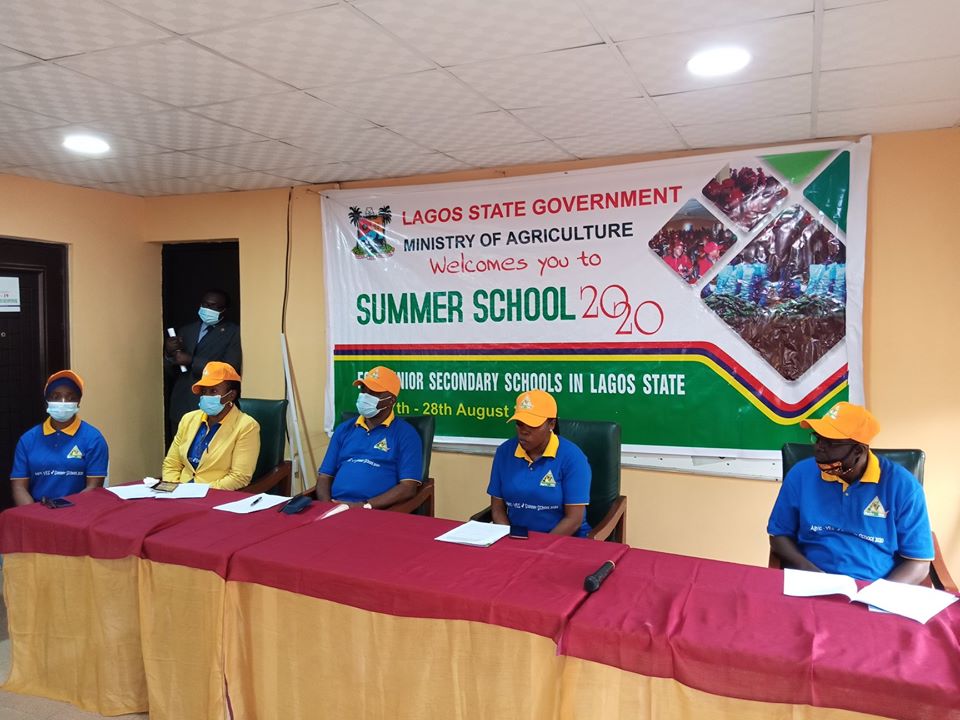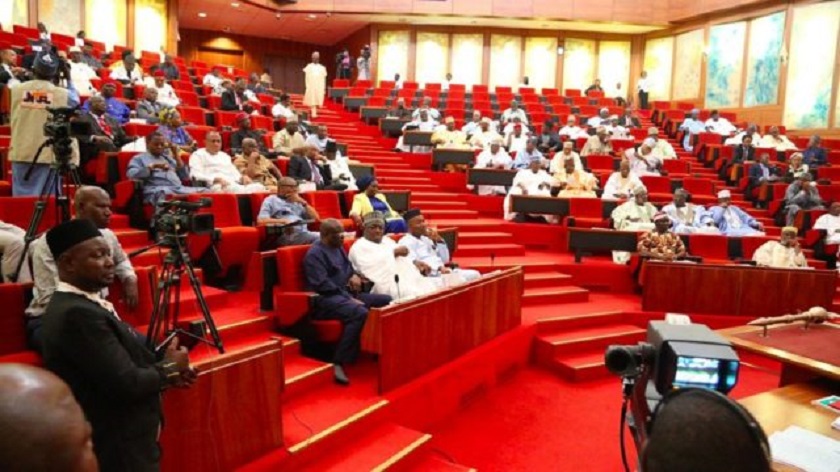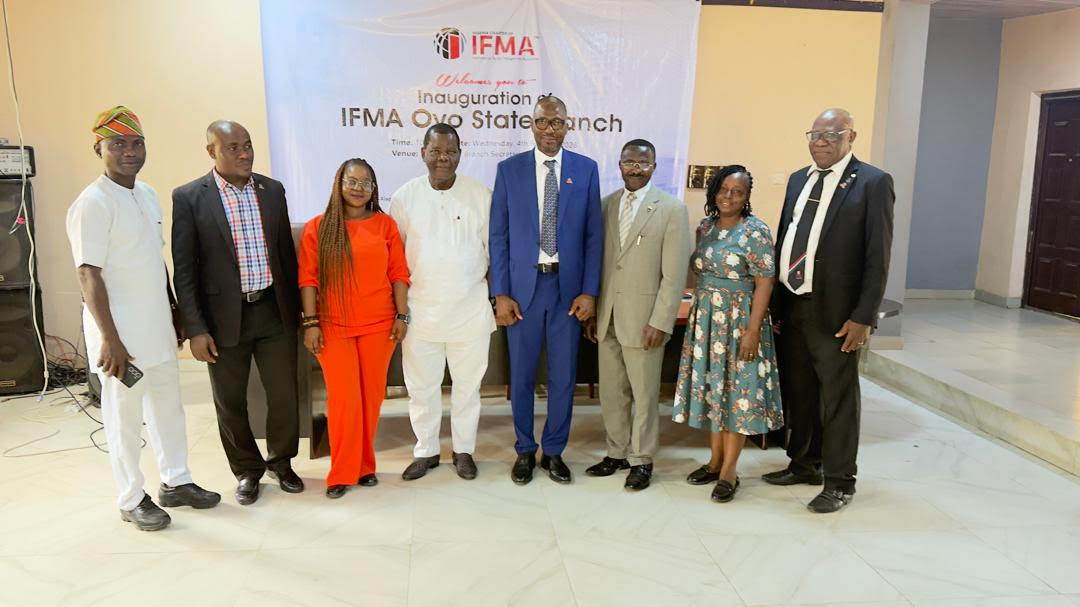General
Lagos Engages Students in Modern Farming Techniques

By Modupe Gbadeyanka
A training programme to make students understand the modern farming techniques has been organised by the Lagos State government.
The initiative is to encourage those who would like to pursue a career in agriculture under the state’s Schools Agricultural Programme (SAP).
According to the state government, the ultimate goal of the programme is to provide food security and an enabling environment for the people to have physical and economic access to sufficient, safe and hygienic food in order to maintain a healthy life, stressing that the agricultural sector requires more recruits, especially the youths.
The acting Commissioner for Agriculture, Ms Abisola Olusanya, said at the opening ceremony of the Y2020 Agric-YES Summer School Programme held at the Lagos State Agriculture Development Authority, Oko-Oba, Agege, that the initiative was designed to encourage students and youths to embrace agriculture and, possibly, fill the void left by ageing farmers.
She recalled that the annual Agric-YES Summer School two-week training was introduced to hold during the long vacation for SSII students offering Agricultural Science as well as their teachers who were selected from public senior secondary schools across the six education districts in Lagos State.
“The Agric-YES Summer School Programme is essentially a programme to draw in the youths, our secondary school students, into exploring the possibilities around being in the agricultural sector.
“There is no better time than just before their SS3. That is before they write their exams into the University and choose a career pathway,” she said.
“We felt that this is the right time for them to see the possibilities around what they can do with the agricultural sector and possibly, we will be able to convince them with the kind of training, particularly the practical aspect of it, to now see the possibilities around being in the agricultural sector. That is the main reason for this programme,” the acting Commissioner averred.
Ms Olusanya disclosed that 84 Senior Secondary School (SSII) Agricultural Science students; 13 Education Officials including Education Desk Officers (Agric) and Agricultural Science teachers are being trained in groups of sizeable batches per class in livestock production, fisheries, crop production and agro-processing among others.
Explaining that the programme is tailored towards achieving the vision of the State Ministry of Agriculture for sustainable food production as well as wealth and job creation through youth empowerment, Ms Olusanya said the curriculum includes poultry, aquaculture and vegetable farming which are areas of competitive and comparative advantage for Lagos State.
The acting Commissioner commended the Ministry of Education for its unflinching support towards Agricultural programmes conducted for students and urged participants to make the most of the training as the State expects them to contribute to the food self-sufficiency goals of government.
Speaking earlier, a beneficiary of the Y2014 edition of the Agric-YES Summer School Programme, Ogunfuyi Sulaimon, now a student of Animal Physiology at the Federal University of Agriculture, Abeokuta, attested to the fact that the programme influenced his choice of career, saying that he still applies the knowledge acquired in his present academic pursuits.
Also, Udara Promise, a present beneficiary expressed hope that she would acquire new skills that would go a long way in shaping her future as she aspires to be a renowned agriculturist.
General
NERC Unveils 3-Step Guide for Resolving Electricity Complaints

By Adedapo Adesanya
The Nigerian Electricity Regulatory Commission (NERC) has introduced a streamlined three-step process to help electricity consumers address common issues like power outages, estimated billing, faulty meters, and voltage fluctuations.
In a public advisory shared on its X handle on Tuesday, the electricity sector regulator emphasised that customers should begin by contacting their respective electricity Distribution Companies (DisCos), which serve as the primary point of contact for technical and billing problems.
Consumers are urged to secure a complaint reference number and maintain records of all interactions for efficient follow-up.
The advisory outlines the process as follows: “Contact your DisCo’s customer care – This is the first step for all technical or billing issues;
“Escalate to State Electricity Regulator (SER) – If unresolved, and the consumer is in a state that has transitioned to an SER;
“Reach NERC Call Centre – For consumers in non-transitioned states or needing further assistance. Contact options include 0201 344 4331, 0908 899 9244, or [email protected],” it said.
“We’re here to make sure your complaint is heard and addressed,” the advisory concluded, aiming to empower consumers amid ongoing challenges in Nigeria’s power sector.
This guidance comes as electricity consumers continue to grapple with service disruptions and billing disputes, highlighting NERC’s efforts to improve accountability across DisCos and state regulators.
General
Senate Passes Electoral Act Amendment Bill After Mild Row

By Adedapo Adesanya
The Senate passed the Electoral Act, 2022 (Repeal and Re-Enactment) Bill 2026 on Tuesday after overcoming a rowdy session that saw lawmakers at loggerheads.
The issue in the upper chamber stemmed from a division over Clause 60 raised by Mr Enyinnaya Abaribe, a member of the opposition party, African Democratic Congress (ADC), from Abia South.
The Senate President, Mr Godswill Akpabio, stated that he believed the demand had previously been withdrawn, but several opposition senators immediately objected to that claim.
Citing Order 52(6), the Deputy Senate President, Mr Barau Jibrin, argued that it would be out of order to revisit any provision on which the Senate President had already ruled.
This submission sparked another uproar in the chamber, during which Mr Sunday Karimi had a brief face-off with Mr Abaribe.
The Senate Leader, Mr Opeyemi Bamidele, then reminded lawmakers that he had sponsored the motion for rescission, underscoring that decisions previously taken by the Senate are no longer valid, maintaining that, consistent with his motion, Mr Abaribe’s demand was in line.
Mr Akpabio further suggested that the call for division was merely an attempt by Mr Abaribe to publicly demonstrate his stance to Nigerians. He sustained the point of order, after which the Abian lawmaker rose in protest and was urged to formally move his motion.
Rising under Order 72(1), Mr Abaribe called for a division on Clause 60(3), specifically concerning the provision that if electronic transmission of results fails, Form EC8A should not serve as the sole basis, calling for the removal of the proviso that allows for manual transmission of results in the event of network failure.
During the division, Mr Akpabio directed senators who supported the caveat to stand. He then asked those opposed to the caveat to rise, to which 15 opposition senators stood.
However, when the votes were counted, the Senate President announced that 15 senators did not support the proviso, while 55 senators voted in support.
Earlier, proceedings in the Senate were momentarily stalled as lawmakers began clause-by-clause consideration of the Electoral Act, 2022 (Repeal and Re-Enactment) Bill 2026, following a motion to rescind the earlier amendment.
The motion to rescind the bill was formally seconded on Tuesday, paving the way for the upper chamber to dissolve into the committee of the whole for detailed reconsideration and reenactment of the proposed legislation.
During the session, the Senate President, Godswill Akpabio, reeled out the clauses one after the other for deliberation.
However, the process stalled when at clause 60, Mr Abaribe raised a point of order, drawing immediate attention on the floor.
This soon caused the session to move into a closed-door session.
Before rescinding the Electoral Act, the red chamber raised concerns over the timing of the 2027 general elections and technical inconsistencies in the legislation.
Rising under Order 52(6) of the Senate Standing Orders, the Senate leader, Opeyemi Bamidele, moved the motion to reverse the earlier passage of the bill and return it to the Committee of the Whole for fresh deliberations.
He explained that the development follows the announcement by the Independent National Electoral Commission (INEC) of a timetable fixing the 2027 general elections for February 2027, after consultations with the leadership of the National Assembly.
He stated that stakeholders had raised concerns that the proposed date conflicts with the provisions of the amended law, particularly the requirement that elections be scheduled not later than 360 days before the expiration of tenure.
He further noted that upon critical review of the passed bill, the 360-day notice requirement prescribed in Clause 28 could result in the scheduling of the 2027 Presidential and National Assembly elections during the Ramadan period.
According to him, holding elections during Ramadan could negatively affect voter turnout, logistical coordination, stakeholder participation, and the overall inclusiveness and credibility of the electoral process.
The motion also highlighted discrepancies discovered in the Long Title and several clauses of the bill, including Clauses 6, 9, 10, 22, 23, 28, 29, 32, 42, 47, 51, 60, 62, 64, 65, 73, 77, 86, 87, 89, 93, and 143. The identified issues reportedly affected cross-referencing, serial numbering, and internal consistency within the legislation.
General
IFMA Nigeria Gets Branch in Oyo, Picks Adejumo Olusola Babatunde as Coordinator

By Modupe Gbadeyanka
A new branch of the International Facility Management Association (IFMA) Nigeria Chapter has been established in Oyo State, with Mr Adejumo Olusola Babatunde chosen as Coordinator.
The organisation set up an arm in the South-West state in a bid to expand its footprint in the country. Mr Babatunde will be assisted by other executive committee members, including Mr Ajiboye Olusola Akeem as Secretary, and Mrs Adeniran Olaide as Treasurer.
At the inauguration of the branch at the Nigerian Society of Engineers (NSE) Secretariat in the Akobo area of Ibadan, the Oyo State capital, the president of IFMA Nigeria, Mr Sheriff Daramola, expressed delight at the successful inauguration of the branch and commended members for their commitment to the growth of facility management in Nigeria.
He highlighted IFMA’s global heritage, noting that the association is supporting over 25,000 members in more than 140 countries worldwide. Mr Daramola emphasised IFMA’s strong global network, the world’s largest and most widely recognised association for facility management professionals, headquartered in the United States and its growing influence in Africa, the Middle East and Europe.
“IFMA members have taken positions of authority across federal, state, and private institutions; IFMA Nigeria is positioned to ensure our professionals are the first choice for global investors entering the Nigerian market,” he stated.
The Legal Adviser of IFMA, Nigeria, Mr Sola Fatoki, who shared this sentiment, said, “Since 1997, when IFMA Nigeria was established, the association has equipped facility management professionals with integrated knowledge spanning human behaviour, infrastructure, and the built environment.”
He encouraged engineers, architects, surveyors, ITC, Technology innovators, data analysts and allied professionals to see IFMA as their professional home and outlined the functions and responsibilities of branch executive committees.
In his remarks, Mr Babatunde expressed gratitude to the national council for the opportunity to serve and pledged to ensure the success of the branch, focusing on unity and the professional advancement of stakeholders in the region.
-

 Feature/OPED6 years ago
Feature/OPED6 years agoDavos was Different this year
-
Travel/Tourism10 years ago
Lagos Seals Western Lodge Hotel In Ikorodu
-

 Showbiz3 years ago
Showbiz3 years agoEstranged Lover Releases Videos of Empress Njamah Bathing
-

 Banking8 years ago
Banking8 years agoSort Codes of GTBank Branches in Nigeria
-

 Economy3 years ago
Economy3 years agoSubsidy Removal: CNG at N130 Per Litre Cheaper Than Petrol—IPMAN
-

 Banking3 years ago
Banking3 years agoSort Codes of UBA Branches in Nigeria
-

 Banking3 years ago
Banking3 years agoFirst Bank Announces Planned Downtime
-

 Sports3 years ago
Sports3 years agoHighest Paid Nigerian Footballer – How Much Do Nigerian Footballers Earn












